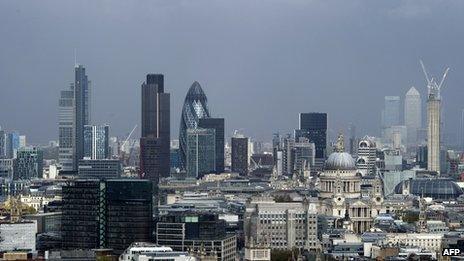New City same as old City?
- Published
- comments

Yesterday I tried - not desperately successfully - to imagine a world outside of the day job, because I was feeling in need of a speedy reboot and re-charge.
This morning I need to break my fast of financial news, temporarily at least, because there were two developments yesterday in sagas that have been woven into the fabric of my recent life.
First was the disclosure that 2011's significant fall in the remuneration of City bankers, and an associated drop in the number of high earning bankers, were temporary phenomena.
According to an authoritative survey by the European Banking Authority, the total number of UK bankers who earned 1m euros (£833,000) or more last year increased 11% to 2,714 and their average pay rose 43% to 2m euros (£1.67m).
Second came the news that the most important hurdle in the rescue of Co-op Bank, a vote by holders of its riskiest debts and preference shares on a conversion of their investments into new bonds, has been surmounted.
Or to put it another way, Co-op Bank has - to all intents and purposes - been saved from collapse, in a voluntary scheme to force huge losses on creditors and convert debts into equity or shares.
Both of these stories matter.
The first confirms that structures right at the centre of the financial earthquake of 2007-08, which triggered the worst recession in living memory, remain in better shape than where most of the rest of the country lives.
If the UK is as lousy as official statistics indicate it may be at growing industries, other than the City's financial services, capable of selling their tangible and intangible wares to the rest of the world, maybe we should be relieved that the banks are still monstrous bonus-generating machines.
However, the rapid recovery in City rewards will be seen as a provocative insult by millions on average earnings struggling to repay their debts and keep the heating on.
This tension, between the City as a source of profound and destabilising social inequality and of economic cataclysms, on the one hand, and the City as world-class exporter, will continue to dominate national discourse, up to and beyond the 2015 general election.
As for the Co-op, in its reborn incarnation it should fit right in to the apparently unreconstructed City of London - now that it will no longer be wholly owned by the battered mutual, the Co-op Group.
As of the beginning of 2014, when the rescue will be completed and the new ownership structure put in place, 70% of Co-op Bank will be owned by investment institutions, led by a group of hedge funds.
Co-op Group insists none of us will notice the difference, that - if anything - it will be seen as an even more conspicuously ethical bank, thanks to a re-writing of the bank's constitutions.
We'll see. And we will also see whether the perception of being "good" is what customers want.
On Thursday Co-op Bank made perhaps the least surprising statement of the year, in the wake of revelations about the extent of its stupendous mismanagement in recent years under the erstwhile chairmanship of a Methodist minister whose expertise in recreational drug use apparently exceeded his knowledge of banking.
"Recent events may have caused some brand and reputational damage, but it is too early to form a definitive view as to the extent of such damage." it said.
Customers have been voting against its recent incompetence, and taking advantage of special offers elsewhere, by switching their current accounts to competitor banks, such as Nationwide, Santander and the reinvented TSB - though not to the point where Co-op Bank is short of vital liquidity or cash.
So the immediate priority for Co-op Bank is probably less to prove that it is good in a moral sense, but that it can be good in a commercial way.
There is however one very good thing to come out of the Co-op Bank debacle - which is that it is the first demonstration, since the mother of all public-sector-funded banking bailouts in 2008, that a medium-sized bank can career to the brink of disaster and be rescued without taxpayers putting in a farthing of investment.
And for those who - perhaps understandably - believe that the source of all financial calamities are investment bankers and hedge fund managers it may be worth noting that it was ethical bankers who wrought havoc at Co-op Bank, and hedgies advised by investment bankers who saved it.